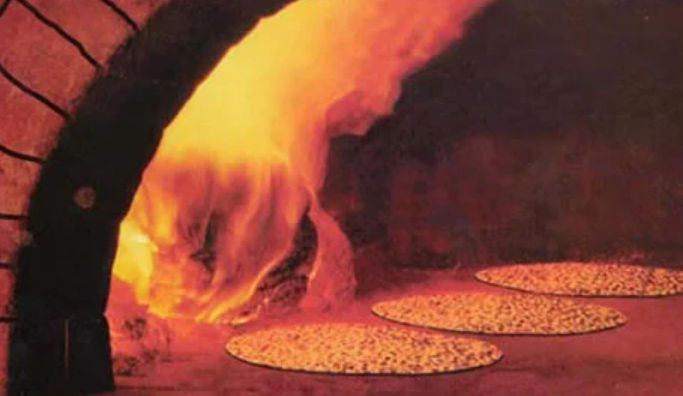
There’s a bakery in New York that produces a very special type of unleavened bread called shmurah matzah. It’s different than the commercially produced matza found in grocery stores.
Every individual matzah is carefully baked by hand to ensure it fulfills the strictest requirement for matzah kosher enough for the yearly Passover Seders attended by the most religiously observant Jews.
The baking of the shmurah matzah begins weeks before Passover. There’s always a large gathering of men who go to the bakery to celebrate the process and also to hopefully have an opportunity to partake in the mitzvah (blessing) of making the holy bread.
Some may hope to hold some flour in their hands, to add the water, or mix the dough.
But there is only one man who puts the matzah in the oven and takes it out at the precise time. Year after year, it is the one same man who bakes the shumurah matzah.
As the man aged, the paddle became too heavy for him to hold. He would sit on a stool next to the oven and tell the helper when to put the dough in and when to take it out. This went on for decades.
And then this year, the Rabbi met with him to suggest he pass the torch to the next generation. By now, the man was at least in his late nineties, possibly even older. No one was sure how old he was, and it’s possible his age was long forgotten by the man himself.
But, it was obvious the struggle to keep up with the baking was far too strenuous – it was time for the man to give up his life-long job.
“Rabbi, you don’t understand why I need to continue my job manning the matzah oven. You see, I was a prisoner at Auschwitz. The Nazis gave me a job with certain privileges that would keep me isolated from the other prisoners, and I would receive more generous rations.
My job was to put the dead bodies in the crematory oven. Yes. My mother, my father, and my sister were all murdered there, and I was the last to see their faces before their bodies become ash and fragments of dry bones.
I am ashamed of what I had to do, and I live with that shame every day of my life. Yet, when I am here, in New York, in America, and I am alive — I am saying to those evil Nazis: ‘You failed.’
With each matzah I bake, I can see the faces of the living, not the dead. I see the faces of the Jewish children who will eat my matzah. I see them and their parents, and their extended families living in freedom, thriving and growing in a world the Nazis tried, but failed to eliminate the Jewish people.”
And so, the tradition continues. The man still bakes.
Ezekiel 37:4-6
Then he said to me, “Prophesy to these bones and say to them, ‘Dry bones, hear the word of the Lord! This is what the Sovereign Lord says to these bones: I will make breath enter you, and you will come to life.”